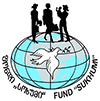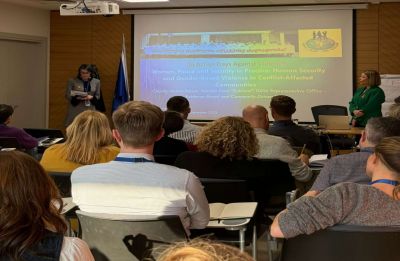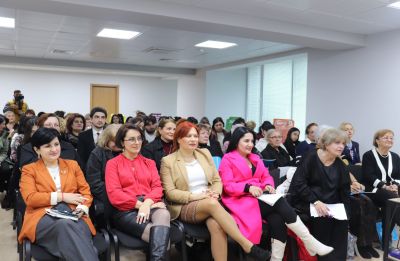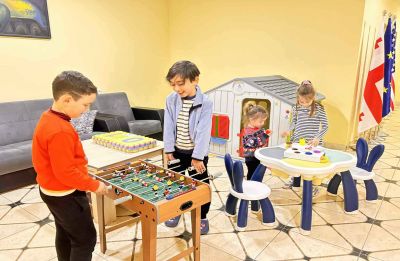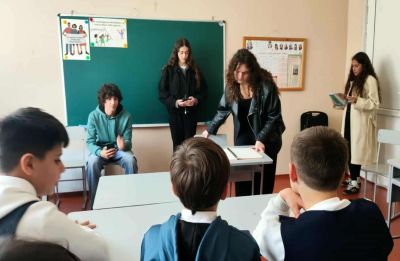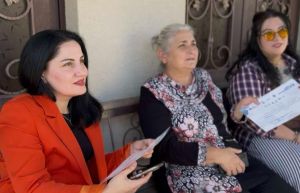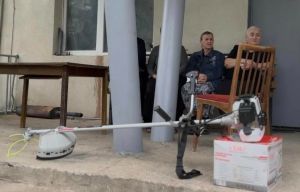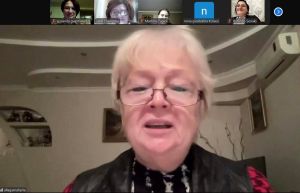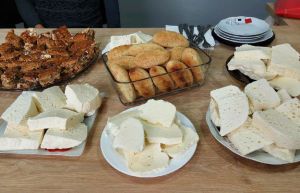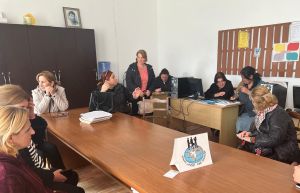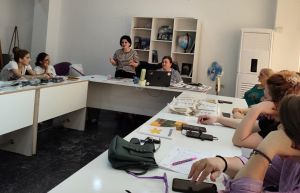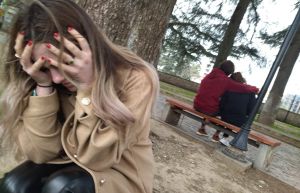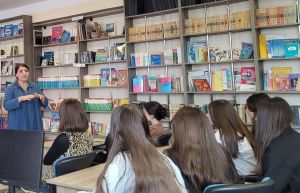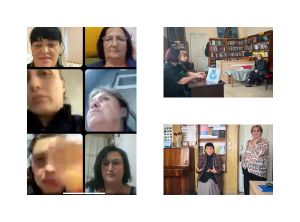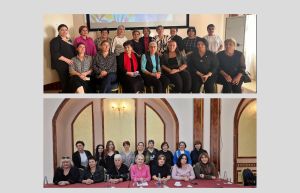The work envisaged by the project has been completed in the IDP settlement of Khoni.
Two problems were solved: due to a faulty drainage system, rainwater accumulated near houses #10 and #15. Residents cut canals that changed the direction of the water. During heavy rains, water got into the basement and flooded, which created a threat to people's health. There were many reptiles and rodents. There was a risk of damage to the basement of the building.
Two initiatives were implemented with the human resources of the local community: the ground was excavated and filled near house #10. A raised fence was installed on the side of the pedestrian path near house #15. Thus, two problems were solved.
The project is implemented with the support
of the UN Women organization
They implemented the initiative envisaged by the project in the IDP settlement of Kutaisi municipality with their own resources. With the grant, residents of the former physics and mathematics boarding school on Leselidze Street, purchased a petrol mower, a water pump and an electric cable, oil for replacement, pliers and an electric machine. These materials will contribute to the creation of a safe living environment in the IDP community.
The project is implemented with the support
of the UN Women organization
Members of Women Initiative Groups of Kutaisi, Tskaltubo, Khoni, Zugdidi and Senaki municipalities, assistants, representative of the donor organization Medea Gugeshashvili and founder of the Fund “Sukhumi” Alla Gamakharia took part in the meeting within the framework of the "Network of Women and Young Women Peace Ambassadors".
The assistants presented information on the work for the reporting period and summed up the results.
In their speeches, the leaders spoke about the events held in the target municipalities (implementation of the initiatives of the II stage) within the framework of supporting "Civil Initiatives".
According to the leaders and members of the initiative groups, this project has increased the involvement of citizens even more. "Civic Initiatives" presented women in society from a different side. They become active and look for ways to solve problems themselves.
As the women noted, at first they themselves did not believe in the victory of their ideas and had little hope for their implementation, but now the problems have been solved - the team and the population are happy with the results achieved.
The project is implemented with the support of the UN Women organization
In Chokhatauri, members of the mutual assistance group held a meeting of a different format - a cheese exhibition. The women brought out their goods. They discussed the creation of a website called "Women of Gogolasubani", which will help sell the products. Group from Tsalenjikha consider the economic empowerment of women from the vulnerable group in their plans for the future.
New participants gathered in Samtredia, they filled out questionnaires, talked about their needs. Tskaltubo group was replenished with new members. The meeting was held online.
Mutual assistance group meetings were also held in other municipalities (Khobi, Zugdidi, Terjola, Kobuleti, Senaki, Vani). New participants addressed - with their problems and hope for their solution. A psychologist from the Women Fund “Sukhumi” actively worked with the women.
The project is implemented with the support the Equality Fund (Canada)
An informational meeting was held in the village Shua Khorga (Khobi municipality), attended by school teachers and parents. The main topic of discussion at the meeting was the prevention of domestic violence and protection of the victim.
The discussion focused on the role and functions of referral entities. The emphasis was on training teachers and medical personnel and providing information about services.
The project is implemented with the support of the organization Brot
für die Welt - Evangelischer Entwicklungsdienst (Germany)
Women Support Centers actively continue to inform citizens about services for victims. Ten cases were identified during the month, including risk groups.
In parallel with the identification of cases, they are also analyzed and assessed. Depending on the need, one part of the beneficiaries is referred to a psychologist, the other to a lawyer. Effective case management significantly reduces the risks of violence and helps to prevent violence.
The project is implemented with the support of the organization Brot
für die Welt - Evangelischer Entwicklungsdienst (Germany)
There have been changes in the acting group of the forum theater, two actors left and two volunteers came to take their place.
The performances of the forum theater were held in the small hall of Kutaisi Meskhishvili Theater, despite the small number of spectators, the discussion was active. The theater staff positively assessed the acting of the young people, the scenes reflecting reality.
The second performance took place in the city center - this is a good experience for the youth. They are actively working, rehearsing and preparing for new performances.
The project is implemented with the support of the organization Brot
für die Welt - Evangelischer Entwicklungsdienst (Germany)
Since the beginning of October, trainings with new members of the Youth Empowerment Centers of 10 municipalities have been actively launched.
The essence of conflict, peace, violence, as well as familiarization with their types and specific examples - these topics were discussed with the participants.
The trainings were conducted both with the direct participation of participants (Zugdidi, Senaki, Tsalenjikha, Khobi, Chokhatauri, Kobuleti, Tskaltubo) and online (Samtredia, Vani, Terjola). The training cycle will continue from next month in all ten municipalities.
The project is implemented with the support of the organization Brot
für die Welt - Evangelischer Entwicklungsdienst (Germany)
The monitoring and advocacy group of the Women Fund "Sukhumi" formed advocacy groups in 10 target municipalities of Western Georgia (Tskaltubo, Khoni, Terjola, Vani, Samtredia, Senaki, Khobi, Chokhatauri, Tsalenjikha, Zugdidi - the village Khurcha), whose members are active women of the communities.
The meetings were devoted to identifying and ranking issues for advocacy. The group members were informed that within the framework of the project they have the opportunity to present "civil initiatives" through which they can solve a specific problem with the help of financial support.
Important problems for local communities were identified, which could not be resolved due to lack of finance.
At the meetings it was noted that the implementation of these initiatives will allow to solve specific problems in the communities and will increase the awareness of the advocacy groups.
The project is implemented with the support of the organization Brot
für die Welt - Evangelischer Entwicklungsdienst (Germany)
Borjomi hosted two training sessions for women leaders and activists from the Samegrelo and Imereti regions on the topic: “Prevention and Response to Gender-Based Violence in War and Post-Conflict Settings.” These two training sessions were conducted as part of a project implemented in partnership with the WAVE Network and with the support of the OSCE-WIN Project, bringing together 30 women leaders.
On the first day, participants delved into how wars and conflicts disproportionately affect women and girls, examining the forms of violence most used against them. They were also introduced to global statistics on gender-based violence during conflicts. Following the presentations, participants identified the different dimensions of gender-based violence in conflict settings and its severe impacts on various vulnerable groups. Through group work, they explored the long-term effects of conflicts, which have a profound impact on women’s and girls’ psychosocial well-being, disrupting their ability to lead fulfilling lives.
The information on key actors responsible for protecting women and girls at both the national and international levels sparked great interest among the participants. The theoretical segment was followed by the analysis of a real-life case study, where participants identified the responsible actors and discussed strategies for preventing violence and responding effectively.
